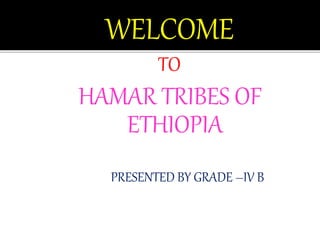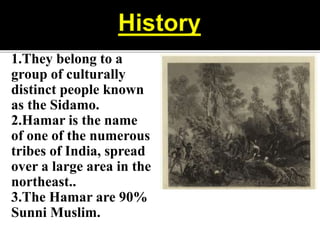3.hamar tribes ppt
- 1. WELCOME TO HAMAR TRIBES OF ETHIOPIA PRESENTED BY GRADE –IV B
- 2. 1.Ethiopia is located in the Horn of Africa. 2. Ethiopia has a high central plateau that varies from 1,290 to 3,000 m. 3.The Hamar Tribe - population about 50,000 - in the Southern Nations.
- 3. 1.They belong to a group of culturally distinct people known as the Sidamo. 2.Hamar is the name of one of the numerous tribes of India, spread over a large area in the northeast.. 3.The Hamar are 90% Sunni Muslim.
- 4. 1.The main diet of Hamar tribe consists of porridge of sorghum and maize, also there’s quite a lot of honey, butter and cheese in their diet. 2.The tribe is also known for their love of a resembling drink - local mash.
- 5. 1.Hamar Unmarried women wear large beaded collars that are usually made of red ,goatskins serving them as clothes. 2. Married women wear two metal rims instead of beaded collars. 3.Men mostly wear only coconut leaves ,bird feathers and beads to cover them.
- 6. 1.The Hamar have unique huts that are made up of mud, wood and straw. 2. Round thatched roof huts are the most common traditional houses of Ethiopia. 3. Walls may vary from sticks or mud-plastered walls.
- 7. 1.Hamar tribes cultivators are they makes their livelihood from farming. 2.Women are great weavers in their tiny loin looms. 3.Women dye their homespun yarns into different colours. 4. Weave clothes for their family.
- 8. 1.Many women cover their hair with a mixture of red- ocher coloring and animal fat, then style it in plaits over their foreheads. 2. The man must then jump over eight bulls in order to be allowed to marry and once that is achieved a celebration is held to end this communal event.
Editor's Notes
- Show an image of sorghum or else students will not understand








